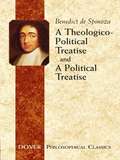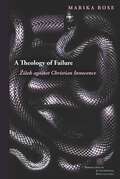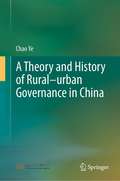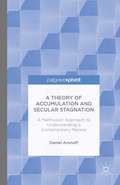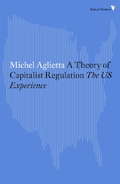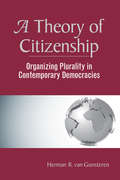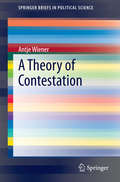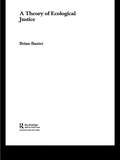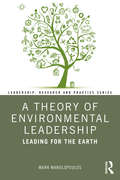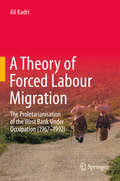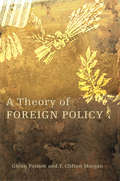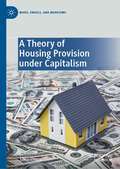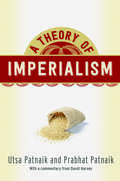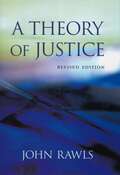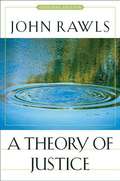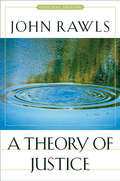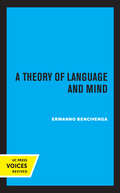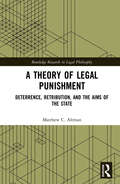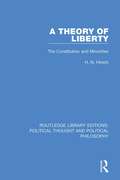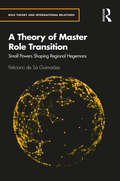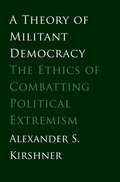- Table View
- List View
A Theologico-Political Treatise and A Political Treatise
by Benedict De Spinoza Francesco Cordasco R. H. Elwes2 important works. Spinoza's "A Theologico-Political Treatise" presents an eloquent plea for religious liberty, demonstrating that true religion consists of the practice of simple piety, independent of philosophical speculation. In the unfinished "A Political Treatise," the author develops a theory of government founded on common consent.
A Theology of Failure: Žižek against Christian Innocence (Perspectives in Continental Philosophy)
by Marika RoseEveryone agrees that theology has failed; but the question of how to understand and respond to this failure is complex and contested. Against both the radical orthodox attempt to return to a time before the theology’s failure and the deconstructive theological attempt to open theology up to the hope of a future beyond failure, Rose proposes an account of Christian identity as constituted by, not despite, failure. Understanding failure as central to theology opens up new possibilities for confronting Christianity’s violent and kyriarchal history and abandoning the attempt to discover a pure Christ outside of the grotesque materiality of the church.The Christian mystical tradition begins with Dionysius the Areopagite’s uncomfortable but productive conjunction of Christian theology and Neoplatonism. The tensions generated by this are central to Dionysius’s legacy, visible not only in subsequent theological thought but also in much twentieth century continental philosophy as it seeks to disentangle itself from its Christian ancestry. A Theology of Failure shows how the work of Slavoj Žižek represents an attempt to repeat the original move of Christian mystical theology, bringing together the themes of language, desire, and transcendence not with Neoplatonism but with a materialist account of the world. Tracing these themes through the work of Dionysius and Derrida and through contemporary debates about the gift, violence, and revolution, this book offers a critical theological engagement with Žižek's account of social and political transformation, showing how Žižek's work makes possible a materialist reading of apophatic theology and Christian identity.
A Theory and History of Rural–urban Governance in China
by Chao YeThis book divides the history of China's rural-urban relations into three stages: antagonism, integration and re-antagonism, and demonstrates that the two coupled variables i.e., policy-culture and coast-trade are the most crucial to urbanization and rural-urban governance in China from ancient times till now. From the perspective of a combination of history and geography, this book puts forward a new theory which is mainly based on Adam Smith's theory and other theories about rural-urban relationship and reinterprets the process and driving forces of evolutionary history of rural-urban relationship over 5,000 years in China. It is useful for researchers and scholars specialized in such fields as rural and urban studies, economics, geography, management and planning for reference.
A Theory of Accumulation and Secular Stagnation: A Malthusian Approach To Understanding A Contemporary Malaise
by Daniel AronoffThomas Malthus identified a crucial tension at the heart of a market economy: While an accumulation of wealth is necessary to provide the capital investment needed to generate growth, too much accumulation will cause planned saving to exceed profitable investment, which will result in secular stagnation, a condition of low growth and underemployment of resources. Keynes drew inspiration from Malthus in his attempt to comprehend the causes of the Great Depression of the 1930s. Now, Aronoff demonstrates how a related but slightly different aspect of Malthus' thought can illuminate one of the most pressing issues of our times. In A Theory of Accumulation and Secular Stagnation, Aronoff explores Malthus' ideas relating to secular stagnation and uses the insight gained to understand the origins of the subpar growth and tepid employment, periodically punctuated by booms, that has plagued the US economy since the turn of the millennium. He explains how the rise of mercantilism among Asian countries – principally China – and increased income concentration generated an upsurge in excess saving. This accumulation created a chronic deficiency in demand while also depressing interest rates, which generated a search for yield that fuelled periodic booms.
A Theory of Capitalist Regulation
by Michel AgliettaMichel Aglietta's path-breaking book is the first attempt at a rigorous historical theory of the whole development of US capitalism, from the Civil War to the Carter presidency. A major document of the "Regulation School" of heterodox economics, it was received as the boldest book in its field since the classic studies of Paul Baran, Paul Sweezy and Harry Braverman.This edition includes a substantial postface by Aglietta, which situates regulation theory in the context of twenty-first-century capitalism.From the Trade Paperback edition.
A Theory of Citizenship: Organizing Plurality in Contemporary Democracies
by Herman R. Van GunsterenDoes vital citizenship require moral consensus? Or is it the ability to organize our differences, that allows people to live together as citizens in a republic? Whereas liberal, republican, and communitarian theories of citizenship analyzed the conditions of citizenship, the central message of this book is that the practical exercise of citizenship, under conditions that are far from ideal, is the main source of its vitality. Instead of arguing for more participation, it focuses on the citizenship of those who, for whatever reason, are already active in the public sphere. Herman van Gunsteren develops a theory of citizenship well suited to the era of political reform that was inaugurated by the revolutions of 1989.
A Theory of Contestation (SpringerBriefs in Political Science)
by Antje WienerThe Theory of Contestation advances critical norms research in international relations. It scrutinises the uses of 'contestation' in international relations theories with regard to its descriptive and normative potential. To that end, critical investigations into international relations are conducted based on three thinking tools from public philosophy and the social sciences: The normativity premise, the diversity premise and cultural cosmopolitanism. The resulting theory of contestation entails four main features, namely types of norms, modes of contestation, segments of norms and the cycle of contestation. The theory distinguishes between the principle of contestedness and the practice of contestation and argues that, if contestedness is accepted as a meta-organising principle of global governance, regular access to contestation for all involved stakeholders will enhance legitimate governance in the global realm.
A Theory of De Facto States: Classical Realism and Exceptional Polities (Routledge Studies in Nationalism and Ethnicity)
by Lucas KnotterA Theory of De Facto States offers a new perspective on the phenomenon of de facto states — political communities that manifest forms of statehood in international politics but lack international legal recognition — zooming in on two prominent examples, Somaliland and Kosovo. Employing a thorough understanding of classical realist theories of international relations, this book provides a fresh critique of the common ways in which existing research tends to identify the ostensible state features of these communities. In contrast to the prevalent portrayals of such features in terms of international legal, discursive, and/or everyday logics, this book argues that de facto states can be most fundamentally characterised as exceptional polities in international relations. Showcasing how the statehood and sovereignty of de facto states is based in international political crises, this book concludes that these entities function as recurring disruptions of any supposed international political order. A Theory of De Facto States will therefore be of interest to researchers of secession, de facto statehood, and International Relations theory alike.
A Theory of Ecological Justice (Environmental Politics #Vol. 8)
by Brian BaxterIn A Theory of Ecological Justice, Baxter argues for ecological justice - that is, for treating species besides homo sapiens as having a claim in justice to a share of the Earth's resources. It explores the nature of justice claims as applied to organisms of various degrees of complexity and describes the institutional arrangements necessary to integrate the claims of ecological justice into human decision-making.
A Theory of Environmental Leadership: Leading for the Earth (Leadership: Research and Practice)
by Mark ManolopoulosIn A Theory of Environmental Leadership, Mark Manolopoulos draws on his original model of leading outlined in his cutting-edge book Following Reason to derive and develop the first properly systematic model of eco-leadership. Suppose humanity’s relation with the Earth may be described in terms of leadership "stages" or modalities: once upon a time, the Earth led or ruled humanity, and now we humans rule or lead the Earth. When the Earth led, the Earth flourished; now that humankind leads, the Earth flounders - ecological crises multiply and intensify. However, there might be a third stage or modality of leadership: humanity leading for the Earth, leading in a way that allows the world, including humans, to re-flourish. What would be the nature of this truly environmental form of leadership? A Theory of Environmental Leadership identifies and critically analyzes the two basic and incompatible positions associated with the way we construe and interact with the non-human: anthropocentrism (human supremacism) and ecocentrism (ecological egalitarianism). By rigorously analyzing and leveraging this polarity, this book outlines an innovative theory of eco-leadership together with some of its confronting-but-necessary measures. Expansive and incredibly timely, A Theory of Environmental Leadership is ideal for a range of audiences, from scholars and students of environmental leadership studies to activists and policymakers. The book’s remarkable clarity and engaging character also makes it suitable for the general public.
A Theory of Fairness and Social Welfare
by Marc Fleurbaey François ManiquetThe definition and measurement of social welfare have been a vexed issue for the past century. This book makes a constructive, easily applicable proposal and suggests how to evaluate the economic situation of a society in a way that gives priority to the worse-off and that respects each individual's preferences over his or her own consumption, work, leisure, and so on. This approach resonates with the current concern to go "beyond the GDP" in the measurement of social progress. Compared to technical studies in welfare economics, this book emphasizes constructive results rather than paradoxes and impossibilities, and shows how one can start from basic principles of efficiency and fairness and end up with concrete evaluations of policies. Compared to more philosophical treatments of social justice, this book is more precise about the definition of social welfare and reaches conclusions about concrete policies and institutions only after a rigorous derivation from clearly stated principles.
A Theory of Forced Labour Migration: The Proletarianisation of the West Bank Under Occupation (1967-1992)
by Ali KadriThis book focuses on labour dislocation and migration of Palestinians between 1967 and 1992. In particular, it highlights the social transformations in the occupied Palestinian territory where Palestinian labour was permitted to work in Israel from 1968 onwards. Elaborating on the results of the policy which saw a gradual increase in the number of Palestinian workers commuting daily from a negligible proportion of the actively participating labour force, to 35 percent of all employed persons, and 60 percent of all wage paid workers, the book studies this unique case which embodies characteristics from permanent migration situations not only in the de-jure, but also the de-facto sense; insofar as it embeds higher risks and reallocates resources as if it was a permanent relocation scenario. Illustrated with tables and econometric results, the book identifies the determinants and implications of migrant labour from the West Bank using two broad methodologies: the neoclassical and the historical-structural method. Each of these methods is divided into two branches: the classical divided into price determined and a choice-theoretic framework,and the historical-structural divided into dependency and Marxist theory. In order to gain a comprehensive understanding of the situation, all four perspectives are employed in the investigation. In doing so, what emerges is a structure for the book which takes shape along the different lines of migration literature. The book provides new insights into the making of wage labour and labour migration theory.
A Theory of Foreign Policy
by Glenn Palmer T. Clifton MorganThis book presents a general explanation of how states develop their foreign policy. The theory stands in contrast to most approaches--which assume that states want to maximize security--by assuming that states pursue two things, or goods, through their foreign policy: change and maintenance. States, in other words, try both to change aspects of the international status quo that they don't like and maintain those aspects they do like. A state's ability to do so is largely a function of its relative capability, and since national capability is finite, a state must make trade-offs between policies designed to achieve change or maintenance. Glenn Palmer and Clifton Morgan apply their theory to cases ranging from American foreign policy since World War II to Chinese foreign policy since 1949 to the Suez Canal Crisis. The many implications bear upon specific policies such as conflict initiation, foreign aid allocation, military spending, and alliance formation. Particularly useful are the implications for foreign policy substitutability. The authors also undertake statistical analyses of a wide range of behaviors, and these generally support the theory. A Theory of Foreign Policy represents a major advance over traditional analyses of international relations. Not only do its empirical implications speak to a broader range of policies but, more importantly, the book illuminates the trade-offs decision makers face in selecting among policies to maximize utility, given a state's goals.
A Theory of Housing Provision under Capitalism (Marx, Engels, and Marxisms)
by Mike BerryThis book provides the first coherent Marxist analysis of the central importance of housing in the social reproduction of capitalism as a whole. Rather than consigning housing to the sidelines, Berry argues that the circulation of capital and revenues though housing and the built environment helps explain how the capital-labour relation constrains housing outcomes while also being reproduced on an extended scale. He shows how housing is provided by the intervention of building, property and interest-bearing capital fractions; how the land question can be explained by a theory of urban land rent, drawing on Marx's categories of differential and monopoly rent; how housing is vital to the extended reproduction of labour power, while also creating a semi-separate sphere of 'home' in which gender and demographic factors overlay and accentuate social class position. The modes, impact and drivers of state intervention in housing provision are seen to modify the patterns and pace of capital circulation through housing and the urban built environment with implications for shifts in class fragmentation and power relations.
A Theory of Imperialism
by David Harvey Akeel Bilgrami Utsa Patnaik Prabhat PatnaikIn A Theory of Imperialism, the economists Utsa Patnaik and Prabhat Patnaik present a new theory of the origins and mechanics of capitalism that sounds an alarm about its ongoing viability. Their theory centers on trade between the core economies of the global North and the tropical and subtropical countries of the global South and considers how the demand for commodities (such as agricultural products and oil) from the South has perpetuated and solidified an imperialistic relationship. The Patnaiks explore the dynamics of this process and discuss innovations that could allow the economies of the South to achieve greater prosperity without damaging the economies of the North. The result is an original theory of imperialism that brings to light the crippling limitations of neoliberal capitalism.A Theory of Imperialism also includes a response to this theory by David Harvey, who interprets the agrarian system differently and sees other factors affecting trade between the North and the South. A rejoinder from the Patnaiks follows. Their debate is one of the most provocative exchanges yet over the future of the global economy as resources grow thin, populations explode, and universal prosperity becomes ever more elusive.
A Theory of Imperialism
by Utsa Patnaik Prabhat PatnaikIn A Theory of Imperialism, economists Utsa Patnaik and Prabhat Patnaik present a new theory of the origins and mechanics of capitalism that sounds an alarm about its ongoing viability. Their theory centers on trade between the core economies of the global North and the tropical and subtropical countries of the global South and considers how the Northern demand for commodities (such as agricultural products and oil) from the South has perpetuated and solidified an imperialist relationship. The Patnaiks explore the dynamics of this process and discuss innovations that could allow the economies of the South to achieve greater prosperity without damaging the economies of the North. The result is an original theory of imperialism that brings to light the crippling limitations of neoliberal capitalism.A Theory of Imperialism also includes a response by David Harvey, who interprets the agrarian system differently and sees other factors affecting trade between the North and the South. Their debate is one of the most provocative exchanges yet over the future of the global economy as resources grow thin, populations explode, and universal prosperity becomes ever more elusive.
A Theory of Justice
by John RawlsSince it appeared in 1971, John Rawls's A Theory of Justice has become a classic. The author has now revised the original edition to clear up a number of difficulties he and others have found in the original book.
A Theory of Justice (Original Edition)
by John RawlsThough the revised edition of A Theory of Justice, published in 1999, is the definitive statement of Rawls's view, so much of the extensive literature on Rawls's theory refers to the first edition. This reissue makes the first edition once again available for scholars and serious students of Rawls's work.
A Theory of Justice: Original Edition
by John RawlsJohn Rawls aims to express an essential part of the common core of the democratic tradition—justice as fairness—and to provide an alternative to utilitarianism, which had dominated the Anglo-Saxon tradition of political thought since the nineteenth century. Rawls substitutes the ideal of the social contract as a more satisfactory account of the basic rights and liberties of citizens as free and equal persons. “Each person,” writes Rawls, “possesses an inviolability founded on justice that even the welfare of society as a whole cannot override.” Advancing the ideas of Rousseau, Kant, Emerson, and Lincoln, Rawls’s theory is as powerful today as it was when first published. Though the revised edition of A Theory of Justice, published in 1999, is the definitive statement of Rawls’s view, much of the extensive literature on his theory refers to the original. This first edition is available for scholars and serious students of Rawls’s work.
A Theory of Justice: Revised Edition
by John RawlsSince it appeared in 1971, John Rawls’s A Theory of Justice has become a classic. The author has now revised the original edition to clear up a number of difficulties he and others have found in the original book. Rawls aims to express an essential part of the common core of the democratic tradition—justice as fairness—and to provide an alternative to utilitarianism, which had dominated the Anglo-Saxon tradition of political thought since the nineteenth century. Rawls substitutes the ideal of the social contract as a more satisfactory account of the basic rights and liberties of citizens as free and equal persons. “Each person,” writes Rawls, “possesses an inviolability founded on justice that even the welfare of society as a whole cannot override.” Advancing the ideas of Rousseau, Kant, Emerson, and Lincoln, Rawls’s theory is as powerful today as it was when first published.
A Theory of Language and Mind
by Ermanno BencivengaIn his most recent book, Ermanno Bencivenga offers a stylistically and conceptually exciting investigation of the nature of language, mind, and personhood and the many ways the three connect. Bencivenga, one of the most iconoclastic voices to emerge in contemporary American philosophy, contests the basic assumptions of analytic (and also, to an extent, postmodern) approaches to these topics. His exploration leads through fascinating discussions of education, courage, pain, time and history, selfhood, subjectivity and objectivity, reality, facts, the empirical, power and transgression, silence, privacy and publicity, and play—all themes that are shown to be integral to our thinking about language. Relentessly bending the rules, Bencivenga frustrates our expectations of a "proper" theory of language. He invokes the transgressions of Nietzsche and Wittgenstein even as he appropriates the aphoristic style of Wittgenstein's Tractatus. Written in a philosophically playful and experimental mode, A Theory of Language and Mind draws the reader into a sense of continual surprise, therapeutic discomfort, and discovery. This title is part of UC Press's Voices Revived program, which commemorates University of California Press’s mission to seek out and cultivate the brightest minds and give them voice, reach, and impact. Drawing on a backlist dating to 1893, Voices Revived makes high-quality, peer-reviewed scholarship accessible once again using print-on-demand technology. This title was originally published in 1997.
A Theory of Legal Punishment: Deterrence, Retribution, and the Aims of the State (Routledge Research in Legal Philosophy)
by Matthew C. AltmanThis book argues for a mixed theory of legal punishment that treats both crime reduction and retribution as important aims of the state. A central question in the philosophy of law is why the state’s punishment of its own citizens is justified. Traditionally, two theories of punishment have dominated the field: consequentialism and retributivism. According to consequentialism, punishment is justified when it maximizes positive outcomes. According to retributivism, criminals should be punished because they deserve it. This book recognizes the strength of both positions. According to the two-tiered model, the institution of punishment and statutory penalties, as set by the legislature, are justified based on their costs and benefits, in terms of deterrence and rehabilitation. The law exists to preserve the public order. Criminal courts, by contrast, determine who is punished and how much based on what offenders deserve. The courts express the community’s collective sense of resentment at being wronged. This book supports the two-tiered model by showing that it accords with our moral intuitions, commonly held (compatibilist) theories of freedom, and assumptions about how the extent of our knowledge affects our obligations. It engages classic and contemporary work in the philosophy of law and explains the theory’s advantages over competing approaches from retributivists and other mixed theorists. The book also defends consequentialism against a longstanding objection that the social sciences give us little guidance regarding which policies to adopt. Drawing on recent criminological research, the two-tiered model can help us to address some of our most pressing social issues, including the death penalty, drug policy, and mass incarceration. This book will be of interest to philosophers, legal scholars, policymakers, and social scientists, especially criminologists, economists, and political scientists.
A Theory of Liberty: The Constitution and Minorities (Routledge Library Editions: Political Thought and Political Philosophy #30)
by H. N. HirschFirst published in 1992. A Theory of Liberty seeks to change the way we think about the American constitution. The focus of the book is the legal status of minority groups in the United States a topic at the top of the current political agenda. Arguing that minority rights were vitally important to the founding fathers, H. N. Hirsch presents an original and provocative look at issues such as affirmative action, abortion, and the rights of children, lesbians and gay men, mental patients, and the physically disabled. In an analysis which blends history, philosophy, law, and social science, Hirsch attacks both liberals who hide from history and conservatives who push for "original intent." He argues that we can remain faithful to the most basic intent of the founding fathers without losing our ability to reinterpret the Constitution against the backdrop of contemporary social "facts." Hirsch exposes the errors and hypocrisy of the current Supreme Court majority, and argues that the Constitution’s liberty can and should be interpreted to protect the rights of minority groups. Timely and controversial, this title offers a challenging look at some of America’s most basic ideological commitments, and will appeal to anyone concerned with the current state of American law or the treatment of minority groups.
A Theory of Master Role Transition: Small Powers Shaping Regional Hegemons (Role Theory and International Relations)
by Feliciano de Sá GuimarãesIn this book, Feliciano de Sá Guimarães offers an original application of Role Theory. He proposes a theory of master role transitions to explain how small powers can change regional powers’ master roles without changing the regional material power distribution.Master role transition is the replacement of an active dominant master role by a dormant or inactive role located within one’s role repertoire. Guimarães argues that only a combination of four necessary conditions can produce a full master role transition: asymmetrical material interdependence, altercasting, domestic contestation and regional contestation. In each one of these conditions, a small power uses material and ideational tools to promote a master role transition within the regional power role repertoire. To test his model, Guimarães turns to five case studies in Latin America, Southern Africa and South Asia: the 2006–2007 Bolivia–Brazil gas crisis, the 2008–2009 Paraguay–Brazil Itaipú Dam crisis, the 2008–2009 Ecuador–Brazil Odebrecht crisis, the 1998 South Africa–Lesotho military intervention crisis and the 1996India–Bangladesh Ganges water crisis.A Theory of Master Role Transition is an excellent resource for those studying both theory and method in International Relations and foreign policy analysis.
A Theory of Militant Democracy
by Alexander S. KirshnerHow should pro-democratic forces safeguard representative government from anti-democratic forces? By granting rights of participation to groups that do not share democratic values, democracies may endanger the very rights they have granted; but denying these rights may also undermine democratic values. Alexander Kirshner offers a set of principles for determining when one may reasonably refuse rights of participation, and he defends this theory through real-world examples, ranging from the far-right British Nationalist Party to Turkey’s Islamist Welfare Party to America’s Democratic Party during Reconstruction.
